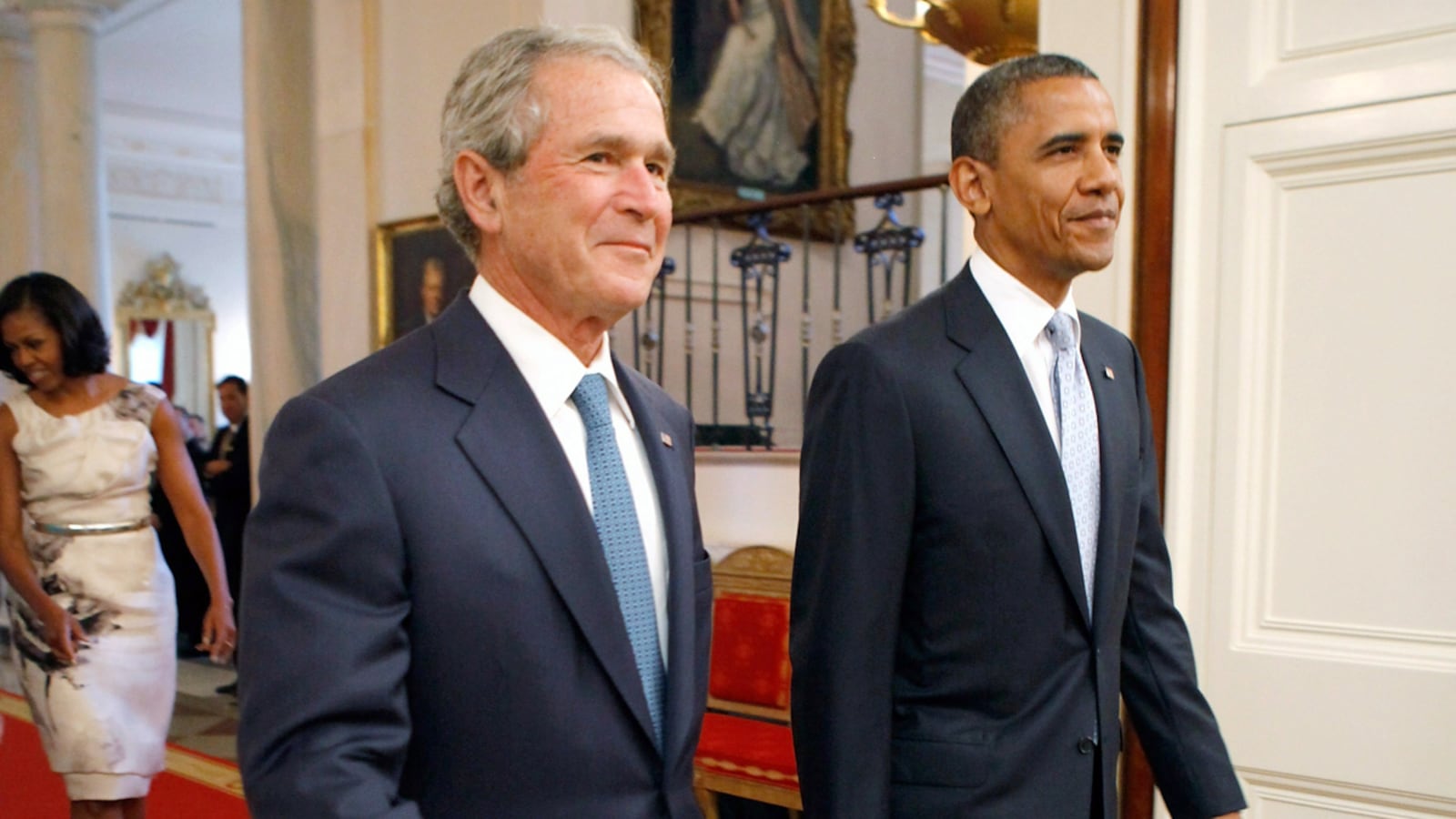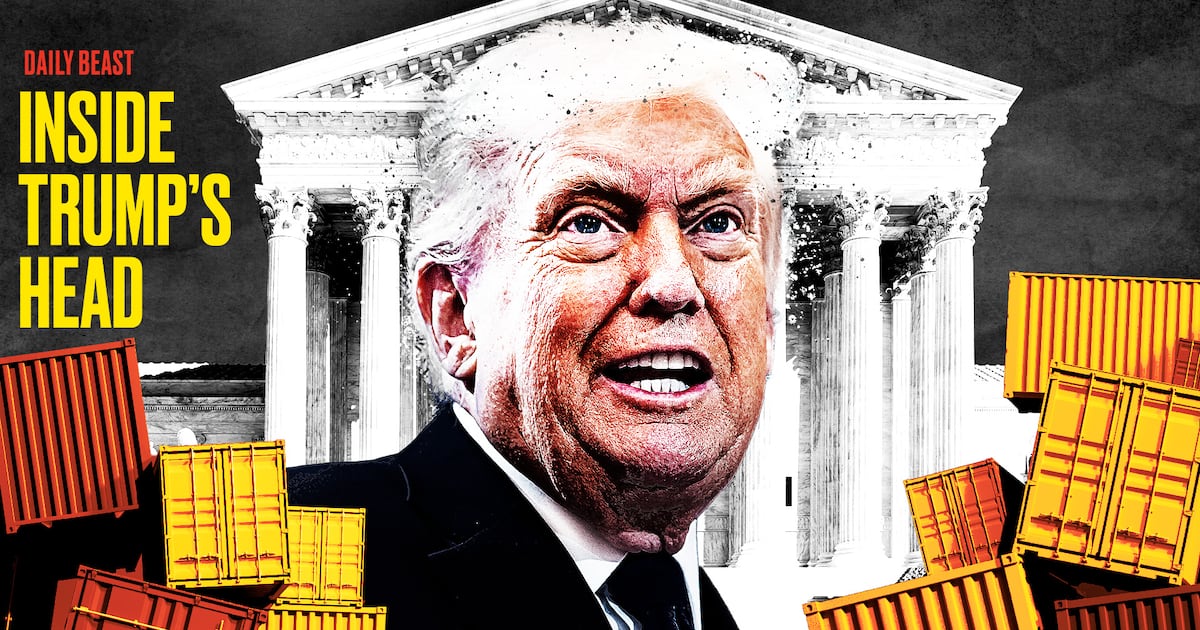If voters want to avoid a painful replay of the fiscal failures of the much-derided Bush administration, their only choice in 2012 demands voting out Barack Obama and giving Mitt Romney a clean shot at real change. Contrary to Democratic propaganda (and conventional wisdom), it’s the current incumbent much more than his Republican challenger who has remixed the toxic Bush cocktail of increased spending and declining revenue, promising a punishing hangover of looming national bankruptcy.

In nearly all of his public appearances, President Obama asks a plaintive rhetorical question: “Why would we want to go back to the same failed policies that got us into this mess in the first place?” Informed citizens ought to answer back: “We don’t want to go back—and that’s why you, sir, should become a one-term proposition!”
The common indictment of the Bush administration isn’t complicated: the 43rd president inherited a substantial surplus from Bill Clinton and turned it into a big deficit by raising spending and cutting revenue.
But if this approach led ultimately to the economic disasters of 2008, then why should anyone have expected a better outcome from the basic contours of Obamanomics, which hiked spending even more than Bush and collected even less tax money to pay the bills? The result—four consecutive years of trillion-dollar budget deficits—represents an unprecedented but utterly predictable catastrophe for the nation’s economic health.
First, a few basic numbers culled from the government’s own data on tax and revenue. In 2000, the last full year of the Clinton presidency, the feds spent 18 percent of the GDP; after eight years of Bush-Cheney leadership, that figure stood at 20.8 percent—a troubling increase of nearly 3 percent over eight years.
By comparison, spending in the four years of Barack Obama’s presidency has already soared to 24.3 percent—a disastrous rise of 3.5 percent—indicating that spending as a portion of the overall economy went up more than twice as fast to fund the grand schemes of Hope and Change than it did to finance the expensive domestic and foreign projects of the Bush regime.
Meanwhile, the flow of government revenues displayed a similarly calamitous pattern for both of our most recent presidents. In 2000, the last year of Clinton and the year before the enactment of the first controversial Bush tax cuts, Washington collected 20.4 percent of the gross domestic product in total direct revenue. After eight years, two major rounds of tax cuts, and the withering impact of the Great Recession, the feds still got 17.6 percent of the GDP.
Under Obama, revenue continued to decline—reaching an all-time postwar low of 14.9 percent in 2010, before rising slightly to a still anemic 15.8 percent this year. That means that revenue under Obama—who, like Bush, lowered taxes for nearly everyone and raised them for almost no one—went down at a faster annualized rate than it did for his predecessor.
With these figures in mind, it’s easy to understand why the gross public debt has gone up far more quickly (and menacingly) under Obama than under Bush—rising by more than $6 trillion in four years for O, as opposed to an increase of less than $4 trillion in W’s two terms.
Both figures are appalling, but the point is that neither administration can claim to have reproduced the generally healthy numbers that prevailed in the years of the Clinton presidency—especially after the voters blessed Slick Willy with the wonderful gift of a reformist Republican Congress in 1994.
When it comes to spending and revenue, in fact, Obama led the nation even further away from Clintonism than did Bush. Another way of saying the same thing would be to note that the Bush fiscal balance sheet—in terms of spending, revenues, and deficits—bore a significantly closer resemblance to the fondly remembered Clinton record than did the first four years of Barack Obama, with their eruption of red ink, explosive spending growth, and plummeting tax intake.
If Obama honestly wants to see a dramatic change in the Bush era leadership, then he would have to implement a drastic change in his own policies, rather than promising more of the same for the second term he ardently desires.
For four long years, Obama has left the Bush tax rates utterly untouched—even for his first two years when he commanded Democratic super-majorities in both houses of Congress. Rather than keeping his campaign promise to raise taxes on the most productive taxpayers, he cut payroll taxes twice and significantly slashed federal revenues. Now, his push to return to Clinton-era rates for the top two tax brackets amounts to populist grandstanding rather than a significant suggestion for shrinking deficits: according to the administration’s own figures, even if he got all the tax hikes he currently seeks he’d add at best $80 billion a year to the federal treasury, providing a deficit reduction of less than 8 percent—and a reduction of nothing at all when coupled with Obama’s proposed spending “enhancements” for second-term priorities like high-speed rail, solar panels, and student loans.
And what about the charge that Romney’s policies would provide even worse fiscal management with his across-the-board cuts in tax rates and sharply higher spending on national defense?
In fact, the candidate and his aides have become increasingly outspoken in promising that they will never allow their tax changes to bring about a reduction in revenues, while anticipating a sharp increase in the money flow to Washington once the economy resumes normal levels of growth. In Ohio on Sept. 26, Romney told a crowd not to expect any reduction in their overall tax burdens because his lower rates would be combined with sweeping tax simplification and the elimination of loopholes. Ronald Reagan succeeded with the same approach in 1986—dropping the top marginal rate all the way from 50 percent to 28 percent, while seeing revenues increase from 17.3 percent of GDP in ’86 to 18 percent in ’90, when the tax cuts had been fully implemented.
In terms of spending, Romney not only promises a legally mandated spending cap of 20 percent of GDP (which would require massive cuts in most federal programs) but also faces a radically different situation that would make it impossible for him to duplicate the spendthrift excesses of either Obama or Bush. When W. took the helm in 2001, he faced the delightful prospect of a substantial surplus and so pushed hard for increased spending on education and other priorities, even before the big added costs of Iraq, Afghanistan, and the War on Terror.
Even if a new Republican president became transfixed by some grand scheme like, say, a federally funded voyage to Mars, he couldn’t afford to indulge that passion in the next four years because of the budget crisis. Romney, therefore, talks about federal programs he means to cut or eliminate rather than promising costly new expansions of government.
Skeptics may insist that neither Romney’s potential cuts in spending nor Obama’s proposed new “investments” in infrastructure amounts to huge sums of money, but it’s fair to ask which emphasis shows a more clear-headed conception of our current fiscal dilemma. And it’s also fair to conclude that Obama sounds far more Bush-like in his blithe determination to avoid unpleasant budgetary realities than does Romney with his repeated promise to impose strict spending limits.
Neither candidate counts as an ideal leader to chart a new direction after the follies of the recent past, but it ought to be obvious that Romney offers a better chance to break the destructive cycle of the Bush-Obama years. Though he’s trying mightily to present himself as the un-Obama, it’s far tougher for the Republican candidate to present himself (appropriately and effectively) as the un-Bush without giving mortal offense to the many W. loyalists in the GOP.
But he should be able to offer a more forceful response to that tired challenge about “going back to the failed policies of George W. Bush.”
First of all, it’s Obama who’s replicated those dangerous patterns in his first four years by reducing revenue and increasing spending and debt. And second, by doubling and tripling down on the most irresponsible aspects of the Bush administration’s economic management, while proposing even more excesses for a second term, the president hasn’t healed the dysfunctional dynamic of our federal government but served to make it immeasurably worse.






